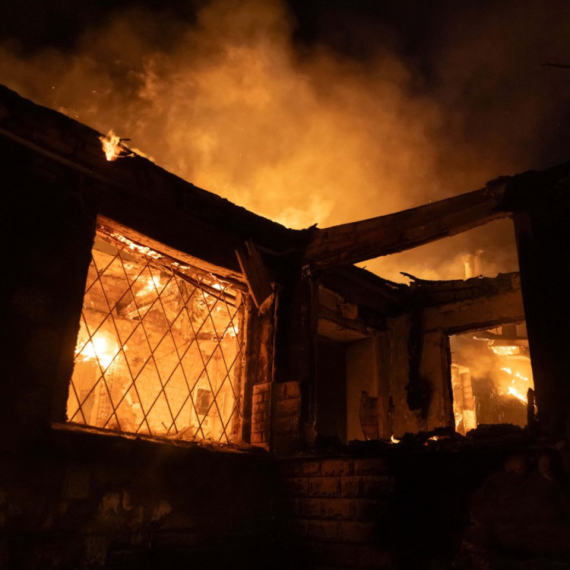New scandal hits health care sector
The International Atomic Energy Agency (IAEA) conducted an extraordinary inspection of the Oncology Institute of Vojvodina, and published a shocking report.
Monday, 19.07.2010.
12:58

The International Atomic Energy Agency (IAEA) conducted an extraordinary inspection of the Oncology Institute of Vojvodina, and published a shocking report. According to the report, cancer patients have had their healthy organs exposed to radiation as they received treatment at that health care institution. New scandal hits health care sector According to the IAEA report, only 30 percent of all cancer patients at the Oncology Institute in the town of Sremska Kamenica were receiving adequate and timely radiation therapy. Others have had to wait up to three months, which was described as unacceptable, and often underwent treatments which also exposed their healthy organs to radiation. IAEA expert Primoz Strojan, who performed the expert supervision at the hospital in March, concluded in his report that treatment facilities were below all international standards which directly resulted in two to three month waiting lists. Strojan wrote that numerous irregularities, mistakes and weaknesses and even negligence on the part of doctors was detected during "almost all phases of treatment". According to the information of the Oncology Institute of Vojvodina, from January 1 until December 15, 2009, radiation therapy was received by about 3,500 patients, which, according to the report, puts the number of those who have been inadequately treated at some 2,500 people. The IAEA report points out that oncology committees, which determine who and when receives treatment, usually consist of doctors who do not have access to radiation zones or contact with the patients about whose future they are deciding. Another shocking fact that has emerged in the report is that treatment records are not even being kept, which relieves the doctors of responsibility and allows untrained staff to perform radiation. Despite the claims that they treatment of patients from abroad was over, Strojan’s report states that there is a constant inflow of patients from the Republic of Srpska to this hospital, causing domestic patients to wait for months. The only bright spot in the report, writes Belgrade daily Vecernje Novosti, is the fact that radiation dosages given to patients are determined in accordance with modern standards. However, due to a failure to implement the so-called in vitro dosage techniques, "there is no way to make sure that patients actually receive the dose which was prescribed to them on a specific day". The Oncology Institute of Vojvodina, meanwhile, has reacted by denying the damning accusations found in the IAEA report. “I don’t know what report you have, but everything written in it is absolutely incorrect,” Head of the Oncology Institute of Vojvodina Radiology Therapy Clinic Marko Erak told the newspaper. “It’s obvious that somebody deliberately sent some kind of report in order to additionally shake the public and give a new dose of fear to the patients. Report of Primoz Strojan, an expert of the International Atomic Energy Agency, is identical to the report of the Serbian Health Ministry and three Belgrade experts who performed extraordinary expert supervision at our institute,” Erak said. All this comes in the wake of a corruption scandal that involved doctors and managers of the Belgrade-based Oncology Institute, and representatives of pharmaceutical companies, who are suspected of giving and taking bribes and conspiring to boost sales of cancer drugs.
New scandal hits health care sector
According to the IAEA report, only 30 percent of all cancer patients at the Oncology Institute in the town of Sremska Kamenica were receiving adequate and timely radiation therapy.Others have had to wait up to three months, which was described as unacceptable, and often underwent treatments which also exposed their healthy organs to radiation.
IAEA expert Primož Strojan, who performed the expert supervision at the hospital in March, concluded in his report that treatment facilities were below all international standards which directly resulted in two to three month waiting lists.
Strojan wrote that numerous irregularities, mistakes and weaknesses and even negligence on the part of doctors was detected during "almost all phases of treatment".
According to the information of the Oncology Institute of Vojvodina, from January 1 until December 15, 2009, radiation therapy was received by about 3,500 patients, which, according to the report, puts the number of those who have been inadequately treated at some 2,500 people.
The IAEA report points out that oncology committees, which determine who and when receives treatment, usually consist of doctors who do not have access to radiation zones or contact with the patients about whose future they are deciding.
Another shocking fact that has emerged in the report is that treatment records are not even being kept, which relieves the doctors of responsibility and allows untrained staff to perform radiation.
Despite the claims that they treatment of patients from abroad was over, Strojan’s report states that there is a constant inflow of patients from the Republic of Srpska to this hospital, causing domestic patients to wait for months.
The only bright spot in the report, writes Belgrade daily Večernje Novosti, is the fact that radiation dosages given to patients are determined in accordance with modern standards. However, due to a failure to implement the so-called in vitro dosage techniques, "there is no way to make sure that patients actually receive the dose which was prescribed to them on a specific day".
The Oncology Institute of Vojvodina, meanwhile, has reacted by denying the damning accusations found in the IAEA report.
“I don’t know what report you have, but everything written in it is absolutely incorrect,” Head of the Oncology Institute of Vojvodina Radiology Therapy Clinic Marko Erak told the newspaper.
“It’s obvious that somebody deliberately sent some kind of report in order to additionally shake the public and give a new dose of fear to the patients. Report of Primož Strojan, an expert of the International Atomic Energy Agency, is identical to the report of the Serbian Health Ministry and three Belgrade experts who performed extraordinary expert supervision at our institute,” Erak said.
All this comes in the wake of a corruption scandal that involved doctors and managers of the Belgrade-based Oncology Institute, and representatives of pharmaceutical companies, who are suspected of giving and taking bribes and conspiring to boost sales of cancer drugs.





















Komentari 0